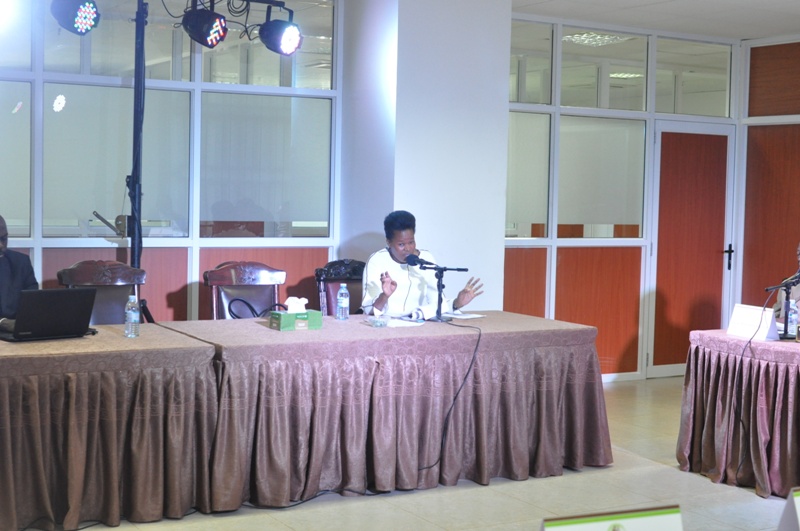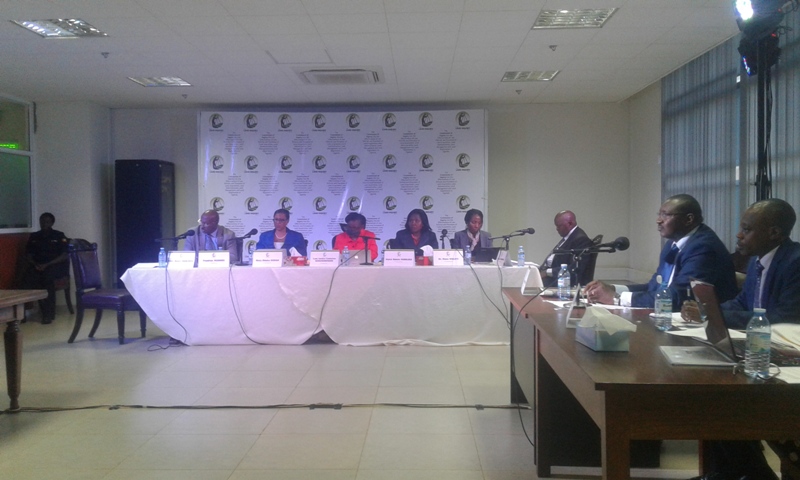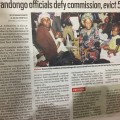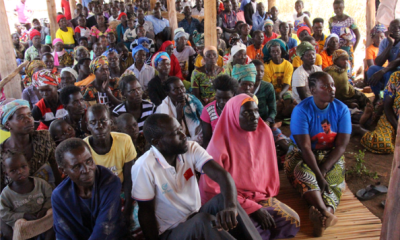WITNESS RADIO MILESTONES
What Minister Nantaba told the Land Commission of Inquiry?
Published
9 years agoon

Ida Nantaba, is a former State Minister in charge of Lands now holding the portfolio of Minister of State for ICT and National Guidance.
On May 25, Nantaba appeared before the commission of inquiry into land acquisition and management headed by Court of Appeal judge Catherine Bamugemereire.
The commission is also inquiring into the effectiveness of law, policies and processes of land acquisition, land administration, land management and land registration in the country.
Due to critical matters, Minister Nantaba raised before the committee detailing how ever-increasing land grabs are planned by big shots in government, aided by government institutions-like police, army ministry of lands, witnessradio.org finds it fit to bring you the session verbatim, and below are excerpts:
 Albert Byenkya (lead counsel, commission): Please state your name, age and residence.
Albert Byenkya (lead counsel, commission): Please state your name, age and residence.
Nantaba: Thank you, my names are Aida Nantaba, I am the Member of Parliament and women representative for Kayunga District. I am the minister of State for ICT and National Guidance.
Byenkya: The reason why you were invited is because you were a minister of State for Lands and the commission wants to benefit from your experiences as a minister. During what period did you served in the ministry of Lands?
Nantaba: That was from 2012 December to 2016 June.
Byenkya: Approximately three years or so.
Nantaba: Yes.
Byenkya: Can you please describe what your mandate was at the time of your office.
Nantaba: I want to refer to the notice of appointment of the committee on illegal eviction that was issued by the President of Uganda and it was published in the Uganda gazette on the May 27, 2013. The terms of reference were mainly five and I will attach a copy on the memorandum which I will furnish the commission.
Our terms of reference are: we were supposed to identify, investigate and return tenants by occupancy and landlords who had been evicted illegally; number two, we were supposed to identify persons involved in illegal land evictions for purposes of prosecution and compensation of victims; three was to sensitise tenants and landowners on their rights and obligations and initiate the process of issuing certificates of occupancy; four was to assist land owners with authenticated eviction orders to execute them and number five was to implement presidential directives as comprised in his statement which was issued on February 2, 2013
Byenkya: What was your experience? How did this committee function? How successful was it in its terms of reference?
Nantaba: I would want to focus on three main areas: that is land administration, registration and management. Those three are the main areas that need to be looked at when we look at land ownership. Land ownership in regard to mailo land, freehold, leasehold and customary occupancy.
Once the three areas are abused or mismanaged, then land disputes crop up. I want to interest the commission into seven issues that surround the three areas that are violated.
Byenkya: Yes proceed.
Nantaba: In Uganda, we have overlapping land rights or land interests. You find a Kibanja owner and the land owner on the same piece of land yet each of them claim rights of occupancy and rights to use and develop that very land and what government has done was to introduce the land fund to solve these overlapping rights. Now land has become a commercial commodity, it is a tradable item where we have so many property agents coming up.
In the past we had landlords that accommodated Bibanja owners but of late someone gets registered on land but because he is not collecting the Busuulu (nominal ground rent), he feels like he is not using the land and therefore not benefiting anything. So he disposes off the land to the present landlord who has turned out to be property agents and these ones look at land as tradable item.
They would start parceling it out in small pieces and then sell it out and don’t accommodate the Kibanja owner who has been sitting on this land for ages. In introducing the National Land policy that now is giving a leeway to partition of land between land owners and the Bibanja owners, sometimes these are two unequals of the land owner and Kibanja owner where the later is not given a chance to say, out of my eight acres I remain with say six instead this property agent who is the new landlord dictates on how many acres, the Kibanja owner will remain with.
So land becoming the hottest commodity on the market today is exposing these Bibanja owners to people who don’t accommodate them as other people with interest on land and therefore just want to take their land without …
Byenkya: May be you will get to recommendations later, but how do we resolve these issues if the land policy is saying lets partition. If you leave it to anybody to negotiate then you will never solve the problem. Is there a way we can find a formula that works, that everybody can accept.
Nantaba: I would want to come to that later because it is one of the issues that would come later. But I was explaining that what is now fuelling land disputes are the overlapping land rights over the same piece of land where we have a Kibanja interest vis-à-vis a landlord who looks at land as another commodity for sale and leaves the Kibanja owner in abeyance.
We have an issue of speculators. Today, the discovery of oil in Uganda is one of the main reasons why disputes are rising. Some people heard, I don’t know from where that Kayunga has oil and so many big people rushed to acquire land in speculation that there is oil. You have seen what happened in Hoima, the entire Bunyoro region is suffering. Land grabbing is very rampant with a view that there is oil and so they anticipate that when compensation is due, they will be the ones to benefit.
Speculation is fuelling land disputes in this country where we are supposed to construct roads, officers in the ministry of Works together with the officers in the ministry of Lands, because they are the ones who know about the project, they rush and acquire land from whoever is sitting on that particular land and remember this is already a price doubled. When they are requesting for payment, they exaggerate the prices and, therefore, exorbitant prices become very difficult for government to compensate and make it difficult for government programmes to be implemented.
The other issue is the introduction of the land fund which I have talked about. I have also realised that some landlords are acquiring big chunks of land that are heavily occupied by tenants in anticipation that when the land fund is availed, they will be the ones to get the biggest share. I have an experience where one of the big persons in government at that time when I was fighting land grabbing and illegal land evictions, rang me and told me that the best thing for me to do is to convince the President to make sure that there is money in the land fund but “instead you think that you will just return land back to evictees. You rather put money and we pay off these landlords”.
But this is land which was grabbed and the title had been fraudulently acquired and the tenants illegally evicted and he is telling me to make sure that the President puts more money in the land fund and we just compensate this man and he goes away. So land fund is another area of speculation where people think that once money is there then we can acquire land which is fully occupied and then we shall compensate from that fund. Its availability has two areas that need to be looked at; the positive part of it and the other part where it is taken advantage of.
Then we have fraud in Land Registration Department. This is wide and I don’t think I will be able to expound fully because it takes various areas where records in the Land Registration Department are tampered with. You find the blue page that reads Nantaba is already changing to a different person and the white page will still be changed because consequently both of them will have to read different details. So when you come with your title, sometimes you are told that is fraudulent one even when it is a genuine title but because they have tampered with the records, your genuine title will be trashed away and you will be deprived of the rights to own land.
Fraud takes multiple land titling. You have heard land where we have various land titles, many of them but describing one single parcel of land.
That fuels land disputes. We have illegal sub divisions; you have a title which has 300 acres but someone sub divides your land, a surveyor and when you come to complain, they tell you that you actually had 100 acres and not 300, so bring that title and we amend the register and we give your title of 100 acres not the 300 that you knew of. This is in the Department of Mapping and Surveys.
We have caveats that are dislodged without the consent of the caveator. You lodge a caveat but you realise someone has a title even when you had lodged a caveat and because the registrar has powers to amend a register sometimes without notifying you, the caveat is dislodged and therefore they transact on your land without your consent.
Sometimes district land boards deny sitting tenant’s opportunity to acquire registrable interests. Many of these know because we tried to sensitise them during our committee operations that you can as well acquire title on the land which you occupy, especially when it is public land. Now when they try to apply, they are denied a chance to be registered because someone with more money is interested in the same land.
There are areas where former leases are denied a chance to renew their leases and I will give examples in my memorandum. We have cases where plot numbers change and when you come to complain to the registrars that are responsible for that, they tell you that title is not there or that land is in Mubende and Kayunga when actually that is your land.
We have registrars who fail to implement court orders. Court delivers judgment in favour of a person to amend the register and the registrar refuses to enter you on title and when they are held accountable they say they have never received this judgment.
We have forged letters of administration instruments. You forge letters of administration and then you are entered on a title and when you request the registrar to amend the register, yours is trashed. Therefore, we have forged documents that are used during the registration process and all this is fuelling land disputes.
We have the influx of investors into this country and quack investors. Quack investors in the sense that we saw people who were obtaining licences for instance to grow sugar but have no land to grow sugarcane and therefore would want to come and influence district land boards.
I will attach minutes where district land boards, a secretary and chairperson sit and sign on reports by area land committees even when the physical work on ground is not done. These are the minutes that they wave in our land offices, they acquire titles upon them and they come and say this is our land.
You ask for a survey report, it is not there, no deed plan, no physical survey done but they are waving a title. And when you try to interrogate, they would want to pay you off such that they shut your mouth up, leave the rest (eviction) to them because they can handle.
Our district land boards are not trained. We appoint chairpersons who have no knowledge in land administration issues; you don’t train and facilitate them. Area land committees are comprised of members that are picked from the community without any knowledge and when you bring documents, they will just append signatures as long as there is payment because it is the applicant who puts them in his car and tells them ‘I want this land and pays’ Government is not paying and you know what this person will do, there is no reason to hesitate to sign an area land committee that shows there are no tenants on land.
Byenkya: As a minister, you must have interacted with the Office of Registrar of Titles, you describe these incidences of malpractices on the part of the registrar of titles. How wide spread is this in the Office of the Registrar of Titles
Nantaba: I would just say that this is enormous because cases that were reported on a daily basis while we were dealing with issues of land evictions were all surrounded by fraud. It is fraud
Byenkya: Does the officers in the registrar of titles participating?
Nantaba: Yes. The registrar of titles, especially the commissioner-land registration has excessive powers.
When you look at the Registration of Titles Act (RTA), they have more powers, which they end up abusing. So they are directly involved in issuing these fraudulent land titles. It is to them you complain and it is upon them to amend the register and when he detects this fraud and refuses to amend the register that means he is directly involved.
Byenkya: Do you think that this office, apart from the powers that they have, the question of legal liability for the actions that they take the legal framework holds them liable for their actions?
Nantaba: No. The RTA for instance gives them power to register. Section 175 of the RTA gives the registrar of titles excessive powers and Section 181, whatever they do during the process, they are not held liable, they even have powers to amend the register without prior consultation of courts of law. Any time they can cancel out an entry, they can enter, and I actually recommend that there is need to review the RTA because it gives excessive powers without holding them accountable for their actions.
Byenkya: Next issue.
Nantaba: The next issue is on the drivers of land disputes. During the committee’s operation, we had to work with institutions like police, courts of law, local governments, officers in the administrator general’s office, district land boards, offices of lands, and many institutions involved in the registration of land processes.
We realised that one of the drivers is the involvement of the institutions that are supposed to be helping in executing the mandates in the land related laws.
Police for instance, we realised that police aides and abets evictions. I will give a scenario in Kayunga where one landlord acquired land in 2008 through fraudulent means. Land was occupied by more than 1,000 people and he swings in with police escorted by the army.
They start assaulting these tenants who were legal occupants, they arrested them, imprisoned them, those who were hesitant and resisting eviction were dragged to courts of law and criminal offences were preferred against them instead of civil cases.
Someone is accused of stealing goats, hitting a cow because they had to bring in as more cows as possible to destroy their crops, demolished their houses, burnt some and some are even still in prison for more than seven years now. And I would want to escort this commission to these prisons and you see these prisoners.
We tried as a committee to rescue as many as possible but many of them are there because they were charged with aggravated robbery. A man who has never touched a gun is charged with aggravated robbery and proving that we would go to courts and listen, but these are people imprisoned before I became chairperson of the committee.
Byenkya: In the case of Kayunga, was there a court order involved?
Nantaba: No court order, even the title was still in the process of being acquired because at this time registrars had started changing details on the title and this man says “I am the owner of this land”, but the landlord is there and these people know him and during this scuffle, both the landlord and the masquerader are in court but evictions are happening on ground.
When others are thrown in courts and in prisons and assaulted, the rest on ground are intimidated and end up leaving even before suffering what the others have faced. The involvement of police in aiding these land grabbers fuels land disputes because they side with others and leave the other party to suffer.
Some of us leaders in connivance with the offices of the RDCs, we also side with some parties and don’t listen to others; sometimes we are bribed. I saw bribes coming daily, “Nantaba get this and shut up, leave the rest to me to handle.”
So you either shut up by a bribe or you fear the person who is evicting because of his position in the army, police, in government, whether he is a minister, the position he is attached to, you just keep your hands off. So you keep quiet as he is evicting people.
Byenkya: Most of these evictions are carried out by highly placed people in various government agencies?
Nantaba: Absolutely. The kind of generals in the army, big people in police, sometimes us ministers, there was a time when I had to face my very Attorney General then, he was attempting to evict some people and I am the chairperson of the committee on illegal land evictions and he is supposed to cover me up in case of any litigation and I am telling him to not evict the people and he is supposed to cover me up in court. This is the level at which sometimes people back off and keep quiet and leave the peasants to suffer because of the person involved and the position he holds in government.
Byenkya: What was the relationship between the committee and other land disputes mechanisms such as courts of law? What laws were you supposed to use under your mandate?
Nantaba: At one time we had to suspend the operations of the committee for lack of a legal framework within which the committee was supposed to operate and at that time I was sued in my individual capacity as Nantaba and not as minister or chairperson of the committee.
This happened several times to an extent that cases were decided against me and I have lost salary to that effect to a tune of more than Shs100 million because myself and the Attorney General, things were sore. I intervened in a case where he was involved, stopping him from evictions and, therefore, there was no any representation in courts of law.
The office which was supposed to cover up neglected us and sometimes we would receive injunctions stopping us from visiting a locus like a case in Mubende. We wrote to the RDC that we were visiting an area and this man rushed to court to stop us from visiting and we were stopped and surprisingly he applied for costs and government could pay damages.
Related posts:

 Gov’t officials top land grabbers list –Land Commission
Gov’t officials top land grabbers list –Land Commission
 Minister Betty Amongin Pinned Before The Land Inquiry Commission
Minister Betty Amongin Pinned Before The Land Inquiry Commission
 Kiryandongo District Authorities are on spot by the commission of inquiry into land matters
Kiryandongo District Authorities are on spot by the commission of inquiry into land matters
You may like
MEDIA FOR CHANGE NETWORK
Uganda moves toward a Bamboo Policy to boost environmental conservation and green growth.
Published
4 weeks agoon
January 21, 2026
By Witness Radio team.
Uganda’s move to develop a national bamboo policy aims to boost environmental conservation and create green jobs, addressing the country’s urgent unemployment issues among the working class.
Bamboo is a critical tool in fighting climate change due to its rapid growth, high carbon sequestration capacity, and ability to produce 35% more oxygen than equivalent trees. As a fast-growing, renewable resource, it restores degraded land, provides sustainable materials that replace emission-intensive products like concrete, and offers a resilient, low-carbon bioenergy source.
Bamboo’s potential is outlined in the existing National Bamboo Strategy. Still, stakeholders stress that a formal policy involving entrepreneurs, farmers, and processors is essential to remove regulatory uncertainty and foster sector growth.
“The strategy is a good document, but it was developed largely through desk research. It did not fully involve entrepreneurs, farmers, and processors who are already working in the bamboo industry,” said Sjaak de Blois, chairman of Bamboo Uganda, encouraging stakeholders to see their role as vital.
The bamboo policy is currently at an early consultative stage, with no draft yet submitted to the cabinet or parliament. Recent consultations brought together representatives from eight government ministries, private-sector bamboo actors, and development partners to begin aligning the strategy with practical regulatory needs.
“What we have now is the starting point,” De Blois mentioned. “The next step is to take the strategy and make it more practical, more market-driven, and more Ugandan. The next step is to move from having a plan to adopting a policy.
Bamboo currently falls under several regulatory frameworks, with no single authority overseeing the sector. The policy push is being driven in part by Bamboo Uganda, a membership-based organization bringing together bamboo farmers and processors, among others. The organization aims to play a coordinating role similar to that historically played by the Uganda Coffee Development Authority in the coffee sector.
“If you want to make a sector meaningful for a country, you need coordination. Coffee became what it is because of an institution that aligned farmers, traders, exporters, and regulators. Bamboo needs the same kind of coordination.” He said.
The policy process is supported by the Belgian development agency, which is funding consultations and facilitating dialogue between the government and the private sector.
Industry players say the absence of clear regulations has constrained investment despite growing demand.
“At the moment, bamboo is everywhere and nowhere at the same time. As a farmer, you talk to forestry, as a charcoal producer, you talk to energy, as a builder, you talk to works. There is no single framework that enables the industry to function.” De Blois added.
Supporters of the policy argue that bamboo could play a significant role in environmental conservation. Bamboo grows rapidly, regenerates after harvesting, and can be harvested annually for decades, reducing pressure on natural forests.
According to Global Forest Watch (GFW), Uganda lost 1.2 million hectares of tree cover between 2001 and 2024, representing a 15% decline from the 2000 baseline. Bamboo has been identified as a key species for restoration.
“One acre of bamboo that is harvested sustainably can prevent the destruction of hundreds of acres of natural forest,” De Blois said. “If we get this right, bamboo can help reverse deforestation rather than contribute to it.”
Ms. Susan Kaikara, from the Ministry of Water and Environment, emphasized bamboo’s potential to drive Uganda’s green-growth agenda.
“Establishing a coherent national policy framework will strengthen coordination, inspire investment, and unlock bamboo’s full potential as a pillar of Uganda’s green economy,” she said.
Uganda’s charcoal market alone is estimated to be worth hundreds of millions of dollars annually, much of it supplied through unsustainable wood harvesting. Industry actors say certified bamboo charcoal plantations could offer a cleaner alternative.
“If they allow us to certify bamboo charcoal plantations, then we can get a trade license to compete or to work together with the existing market. We will reverse deforestation. We would enter an industry of about 500,000 hectares, creating smart, green jobs. We can digitalize them to make them attractive through bamboo agroforestry. So again, those things need a policy.” He adds.
Bamboo is also viewed as a climate-friendly crop due to its high capacity for carbon sequestration. Its rapid growth enables it to absorb large amounts of carbon dioxide, while its extensive root system improves soil structure and increases long-term carbon storage.
“When you look at carbon sequestration, bamboo offers several advantages. Residues from harvested bamboo can be converted into biochar, locking carbon into the soil for long periods. When you also see the sequestration per acre compared to many other trees, it is five or six times higher. So, we sequester a lot,” De Blois said
Stakeholders say that if the policy process progresses as planned, bamboo could emerge as one of Uganda’s key green growth sectors within the next decade.
“Policy making takes time. But what is important is that we have started the conversation with all the right ministries in the room. From here, it is about taking steady, practical steps.” He concluded.
Related posts:

 As Uganda awaits the Energy Efficiency and Conservation law, plans to develop a five-year plan are underway.
As Uganda awaits the Energy Efficiency and Conservation law, plans to develop a five-year plan are underway.
 REC25 & EXPO Ends with a call on Uganda to balance conservation and livelihood
REC25 & EXPO Ends with a call on Uganda to balance conservation and livelihood
 Africa’s growth lies with smallholder farmers
Africa’s growth lies with smallholder farmers
 Green Resources’ forestry projects are negatively impacting on local communities – donor
Green Resources’ forestry projects are negatively impacting on local communities – donor
WITNESS RADIO MILESTONES
A Global Report reveals that Development Banks’ Accountability Systems are failing communities.
Published
3 months agoon
December 4, 2025
By Witness Radio team.
For decades, development projects have been funded to address some of the World’s most pressing problems, including poverty, wildlife conservation, and climate change. However, what unfolds on the ground is sometimes the opposite of development. Instead of benefits, these projects have often harmed the very people they are supposed to support.
The effort to address such harm has led to the establishment of Independent Accountability Mechanisms (IAMs) by various development banks. Yet, communities affected by these projects often face betrayal by national court systems, leaving them feeling overlooked and vulnerable, emotions that underscore the urgent need for effective justice.
According to experts in development financing, since the early 1990s, development banks have sought to address and mitigate harm through IAMs—non-judicial grievance mechanisms that provide a direct avenue for impacted communities to raise concerns, engage with project implementers, and obtain remedies for the harm they have experienced.
The study, conducted by Accountability Counsel and titled Accountability in Action or Inaction? An Empirical Study of Remedy Delivery in Independent Accountability Mechanisms shows that while IAMs exist, their relevance has fallen short, underscoring the urgent need for reform to restore community trust and hope.
In compiling the report, researchers reviewed 2,270 complaints across 16 IAMs and conducted 45 interviews covering 25 cases globally.
The report reveals a persistent gap between the promise of remedies and their realization, highlighting that only 15% of closed complaints led to commitments, and just 10% achieved full completion, underscoring the urgent need for effective remedies for communities.
The findings highlight ongoing challenges, including inadequate implementation, limited monitoring, and persistent power imbalances, which continue to block communities from accessing meaningful remedies and demand immediate reform.
“The consequences of these institutional gaps are severe. As these cases show, institutional silence can exacerbate risk, while meaningful intervention can help de-escalate it.” The Report adds.
Uganda is among the countries where communities have sought justice using these accountability mechanisms. Between 2006 and 2010, communities in one of the districts of Uganda were brutally evicted by the UK-based Company, which was growing trees in the area.
The company was formerly an investee of the Agri-Vie Agribusiness Fund, a private equity fund supported by the International Finance Corporation (IFC), the private sector arm of the World Bank Group. The community filed a Complaint with the IFC’s accountability mechanism, the Compliance Advisor Ombudsman (CAO).
“We complained to this body in 2011, hoping for justice, but over 15 years later our people are still struggling, living miserably, some without homes,” a community land and environmental defender told the Witness Radio team.
According to the affected residents, the CAO process did not lead to success or meaningful compensation, as they had hoped.
Between 2013 and 2014, the communities, with support from the CAO, signed a final agreement with the Company to address the harm. Among other commitments, this included resettlement of the affected communities.
In its 28-page report published in 2015 titled: A Story of Community-Company Dispute Resolution in Uganda, the CAO wrote,” With the agreements concluded, implementation is gathering pace. As agreed, the company has begun extending development assistance to both cooperatives, and the process of restoring and enhancing livelihoods has commenced.
The first step taken by both cooperatives was to acquire land. In late 2013, the Mubende Cooperative bought 500 acres of ‘fertile agricultural land’ in the Mubende district. Their vision was to allocate a certain percentage of the land for resettlement, with the remainder utilized for farming projects.
Reports from the ground indicate that communities remain dissatisfied with the process, claiming it failed to address their concerns fully and highlighting the urgent need for more effective remedy systems.
“When you say that people are well, it is really a total lie. Many people were never compensated or resettled. Even those who got a portion of land say they have never seen a fertile land—I have never seen it, because people are living or cultivating on rocky, infertile lands,” the defender further revealed.
The struggle faced by the Ugandan community is not unique. Their experience mirrors what the Accountability Counsel report identifies worldwide. Despite registering more than 2000 complaints by communities harmed by bank-financed projects globally, there has been no comprehensive system-wide analysis of whether and how often these mechanisms deliver meaningful remedies, defined as tangible, material outcomes that repair harm and improve lives.
In addition to the slow success of such IAMs, the report notes that, across interviews covering 25 complaints, 84% referenced retaliation, violence, or threats of violence-an alarming indicator of the risks faced by communities seeking justice, demanding immediate attention and action.
“Government officials and company representatives were frequently implicated in efforts to suppress dissent. This not only reduces the likelihood of achieving a substantial remedy, but also suppresses the willingness of community members to speak honestly and openly about Complaint outcomes.” The report further adds,
Further, it reveals that communities described a range of retaliatory tactics, including physical clashes, arrests, detentions, fatalities, intimidation and harassment, death threats, and anonymous warning letters, among others.
“Remedy must be reimagined not as a peripheral concern but as a core responsibility of development institutions. It must be adequately resourced, independently monitored, and centered around the needs and voices of affected people,” the report adds.
The report recommends that development banks and IAMs establish a Remedy Framework with clear standards to ensure remedies are timely, adequate, and community-centered, and to encourage stakeholders to prioritize systemic reform for better justice outcomes.
The report also urges development banks and their accountability mechanisms to make remedies a foundational element of responsible finance. Adopting institutional frameworks that prioritize redress, empowering IAMs to oversee and enforce commitments, and incorporating the outcomes of IAM processes into project evaluations and institutional learning.
Related posts:

 Banks have given almost $7tn to fossil fuel firms since Paris deal, report reveals
Banks have given almost $7tn to fossil fuel firms since Paris deal, report reveals
 Opinion: USAID needs an independent accountability office to improve development outcomes
Opinion: USAID needs an independent accountability office to improve development outcomes
 Communities Under Siege: New Report Reveals World Bank Failures in Safeguard Compliance and Human Rights Oversight in Tanzania
Communities Under Siege: New Report Reveals World Bank Failures in Safeguard Compliance and Human Rights Oversight in Tanzania
 Oxfam Report 2011: When Indigenous communities named Rwanda nationals by investor to run away from corporate accountability
Oxfam Report 2011: When Indigenous communities named Rwanda nationals by investor to run away from corporate accountability
MEDIA FOR CHANGE NETWORK
Young activists fight to be heard as officials push forward on devastating project: ‘It is corporate greed’
Published
6 months agoon
August 27, 2025
“We refuse to inherit a damaged planet and devastated communities.”
Youth climate activists in Uganda protesting the East African Crude Oil Pipeline, or EACOP, are frustrated with the government’s response to their demonstration as the years-long project moves forward.
According to the country’s Daily Monitor, youth activists organized with End Fossil Occupy Uganda took to the streets of Kampala in early August to protest EACOP. The pipeline, under construction since about 2017 and now 62 percent complete, is set to transport crude oil from Uganda’s Tilenga and Kingfisher fields through Tanzania to the Indian Ocean port of Tanga by 2026.
Activists noted the devastating toll, with group spokesperson Felix Musinguzi saying that already around 13,000 people “have lost their land with unfair compensation” and estimating that around 90,000 more in Uganda and Tanzania could be affected. End Fossil Occupy Uganda has also warned of risks to vital water sources, including Lake Victoria, which it says 40 million people rely on.
The group has been calling on financial institutions to withdraw funding for the project. Following a demonstration at Stanbic Bank earlier in the month, 12 activists were arrested, according to the Daily Monitor.
Some protesters were seen holding signs reading “Every loan to big oil is a debt to our children” and “It’s not economic development; it is corporate greed.”
Meanwhile, the regional newspaper says the government has described the activist efforts as driven by foreign actors who mean to subvert economic progress.
EACOP’s site notes that its shareholders include French multinational TotalEnergies — owning 62 percent of the company’s shares — Uganda National Oil Company, Tanzania Petroleum Development Corporation, and China National Offshore Oil Corporation.
The wave of young people taking action against EACOP could be seen as a sign of growing public frustration over infrastructural projects that promise economic gain while bringing harm to local communities and ecosystems. Activists say residents face costly threats from pipeline development, such as forced displacement and the loss of livelihoods.
Environmental hazards to Lake Victoria could also disrupt water supplies and food systems, bringing the potential for both financial and health impacts. Just 10 years ago, an oil spill in Kenya caused a humanitarian crisis. The Kenya Pipeline Company reportedly attributed the spill to pipeline corrosion, which led to contamination of the Thange River and severe illness.
The EACOP project has already locked the region into close to a decade of development, and concerns about the pipeline and continued investments in carbon-intensive systems go back just as long. Youth activists, as well as concerned citizens of all ages, say efforts to move toward climate resilience can’t wait. “As young people, we refuse to inherit a damaged planet and devastated communities,” Musinguzi said, per the Monitor.
Source: The Cool Down
Related posts:

 Put people above profits – Climate Activists urge Total to defund EACOP
Put people above profits – Climate Activists urge Total to defund EACOP
 EACOP: The number of activists arrested for opposing the project is already soaring in just a few months of 2025
EACOP: The number of activists arrested for opposing the project is already soaring in just a few months of 2025
 EACOP activism under Siege: Activists are reportedly criminalized for opposing oil pipeline project in Uganda.
EACOP activism under Siege: Activists are reportedly criminalized for opposing oil pipeline project in Uganda.
 The East African Court of Justice fixes the ruling date for a petition challenging the EACOP project.
The East African Court of Justice fixes the ruling date for a petition challenging the EACOP project.

UPDF General on the spot over fresh evictions in Hoima

Small-scale fishers and coastal communities are pushing to testify before a human rights commission investigating the causes of food inequality in South Africa.

The Kenyan government insists on maintaining provisions of the Seed Act that the court nullified: farmers and legal experts question the motive.

FEATURE: What Lagos Can Learn From Kenya, Morocco, Uganda’s Forced Evictions

Women environmental rights defenders in Africa are at the most significant risk of threats and attacks – ALLIED New report

Uganda moves toward a Bamboo Policy to boost environmental conservation and green growth.

Evicted from their land to host Refugees: A case of Uganda’s Kyangwali refugee settlement expansion, which left host communities landless.

200 farmers demonstrate at parliament, worried about new seed monopoly

Innovative Finance from Canada projects positive impact on local communities.
Over 5000 Indigenous Communities evicted in Kiryandongo District
Petition To Land Inquiry Commission Over Human Rights In Kiryandongo District
Invisible victims of Uganda Land Grabs
Resource Center
- Land And Environment Rights In Uganda Experiences From Karamoja And Mid Western Sub Regions
- REPARATORY AND CLIMATE JUSTICE MUST BE AT THE CORE OF COP30, SAY GLOBAL LEADERS AND MOVEMENTS
- LAND GRABS AT GUNPOINT REPORT IN KIRYANDONGO DISTRICT
- THOSE OIL LIARS! THEY DESTROYED MY BUSINESS!
- RESEARCH BRIEF -TOURISM POTENTIAL OF GREATER MASAKA -MARCH 2025
- The Mouila Declaration of the Informal Alliance against the Expansion of Industrial Monocultures
- FORCED LAND EVICTIONS IN UGANDA TRENDS RIGHTS OF DEFENDERS IMPACT AND CALL FOR ACTION
- 12 KEY DEMANDS FROM CSOS TO WORLD LEADERS AT THE OPENING OF COP16 IN SAUDI ARABIA
Legal Framework
READ BY CATEGORY
Newsletter
Trending
-

 NGO WORK2 weeks ago
NGO WORK2 weeks agoUS-DRC Strategic Partnership Agreement Faces Constitutional Challenge in Court
-

 MEDIA FOR CHANGE NETWORK2 weeks ago
MEDIA FOR CHANGE NETWORK2 weeks agoIndigenous communities’ complaint against World Bank-linked Nepal Cable Car Project declared eligible for investigation.
-

 MEDIA FOR CHANGE NETWORK2 weeks ago
MEDIA FOR CHANGE NETWORK2 weeks agoDecades of land loss and chronic poverty: Salala Rubber Plantation prioritizes profit over the well-being of local Liberian communities.
-

 MEDIA FOR CHANGE NETWORK2 weeks ago
MEDIA FOR CHANGE NETWORK2 weeks agoThe Witness Radio and Seed Savers Network Joint Radio program boosts Farmers’ knowledge of seed and food sovereignty.
-

 MEDIA FOR CHANGE NETWORK1 week ago
MEDIA FOR CHANGE NETWORK1 week agoFEATURE: What Lagos Can Learn From Kenya, Morocco, Uganda’s Forced Evictions
-

 MEDIA FOR CHANGE NETWORK1 week ago
MEDIA FOR CHANGE NETWORK1 week ago13 years after the refugee host community was forcefully evicted to expand a refugee settlement, thousands remain unsettled.
-

 MEDIA FOR CHANGE NETWORK3 days ago
MEDIA FOR CHANGE NETWORK3 days agoThe Kenyan government insists on maintaining provisions of the Seed Act that the court nullified: farmers and legal experts question the motive.
-

 MEDIA FOR CHANGE NETWORK1 day ago
MEDIA FOR CHANGE NETWORK1 day agoUPDF General on the spot over fresh evictions in Hoima
